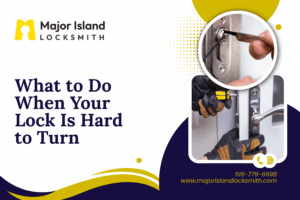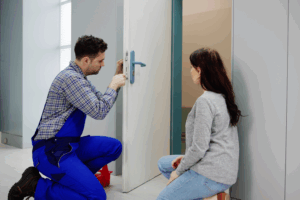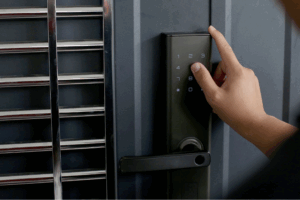Securing your property with the right locks is essential for maintaining safety and peace of mind. Whether you’re safeguarding your residence or securing your business premises, selecting the appropriate locks can significantly enhance your overall security strategy. In this comprehensive guide, we’ll explore different types of locks suitable for residential and commercial settings, factors to consider when choosing them, the importance of professional installation, maintenance tips to ensure optimal performance, and additional considerations for both residential and commercial applications.
Types of Locks for Residential and Commercial Use
Choosing the right locks involves understanding the specific needs of residential and commercial properties. Here are key considerations for each setting:
Residential
Residential properties require locks that offer robust security while catering to the needs of everyday life:
- Deadbolt Locks: Single-cylinder deadbolts are commonly used for residential doors, providing reliable security with a key-operated mechanism on the outside and a thumbturn on the inside for easy locking. They are simple yet effective, offering a good balance between security and convenience.
- Smart Locks: Smart locks have gained popularity for their convenience and enhanced security features. They allow homeowners to control access through smartphone apps, keypads, or even biometric scans. Smart locks can integrate with home automation systems, providing added functionalities like remote locking/unlocking and activity monitoring.
- Padlocks: Ideal for securing gates, sheds, and garages, padlocks come in various types including combination and keyed varieties. They offer flexibility and varying levels of security based on the quality and material of construction.
Commercial
Commercial properties require locks that prioritize security, accessibility, and management capabilities:
- High-Security Deadbolts: Double-cylinder deadbolts, requiring a key for both sides, offer enhanced security for commercial entrances, offices, and storage areas where controlled access is crucial. They are resistant to picking and tampering, making them suitable for high-traffic areas and locations with valuable assets.
- Keyless Entry Systems: Keyless entry systems using access cards, keypads, or biometric readers provide efficient access control for employees and visitors. These systems integrate seamlessly with existing security protocols and allow for centralized management of access privileges. Keyless entry is advantageous in environments where frequent access changes are necessary, such as office buildings and educational institutions.
- Commercial-Grade Padlocks: Heavy-duty padlocks designed for commercial use provide durability and resistance to physical tampering. They are suitable for securing gates, perimeter fences, and equipment storage areas in industrial settings.
Factors to Consider When Choosing Locks
Whether for residential or commercial use, several factors should guide your selection of locks:
- Security Requirements: Assess the security needs based on the location, value, and occupancy of the property. Properties located in high-crime areas or housing valuable assets may require stronger security measures such as high-security deadbolts or electronic access control systems.
- Operational Needs: Consider how the locks will be used daily. Residential locks should offer ease of use for family members, including children and elderly residents. Commercial locks need to accommodate multiple users with varying access levels, ensuring smooth operations without compromising security.
- Compliance and Standards: Ensure that the selected locks comply with relevant security standards and regulations applicable to your industry or region. This is particularly important for commercial properties subject to specific security protocols like HIPAA (Health Insurance Portability and Accountability Act) for healthcare facilities or PCI DSS (Payment Card Industry Data Security Standard) for businesses handling credit card information.
- Durability and Weather Resistance: Choose locks made from durable materials such as solid brass, stainless steel, or hardened alloys. Consider weather-resistant coatings or seals for locks installed in outdoor locations to prevent corrosion and ensure long-term performance.
Importance of Professional Installation
Proper installation is critical to maximizing the effectiveness of your chosen locks:
- Expertise: Professional locksmiths have the knowledge and tools to install locks correctly, ensuring they function as intended and provide maximum security. They understand the nuances of different lock types and can recommend the best installation methods for optimal performance.
- Security Assessment: Locksmiths can assess your property’s security needs and recommend suitable locking solutions tailored to your specific requirements. They consider factors such as entry points, traffic flow, and desired security levels to provide comprehensive security solutions.
Maintaining Your Locks
Regular maintenance is essential to prolonging the lifespan and efficiency of your locks:
- Routine Inspections: Periodically inspect locks for signs of wear, damage, or malfunction. Check door frames and strike plates for alignment issues that may affect locking mechanisms.
- Lubrication: Apply lubricant to lock mechanisms annually to prevent rust and ensure smooth operation. Use graphite-based lubricants for internal components and silicone-based lubricants for external parts exposed to weather elements.
- Upgrades and Replacements: Consider upgrading older locks to newer models with enhanced security features as technology evolves. Replace damaged or worn-out locks promptly to maintain security integrity.
Additional Considerations
Residential Applications
- Child Safety: Install locks that are child-proof or equipped with safety features to prevent accidental lockouts or injuries.
- Pet Accessibility: Choose locks that allow easy access for pets while maintaining security for your home.
- Home Insurance Requirements: Some insurance policies may require specific types of locks or security measures to be eligible for coverage. Check with your insurance provider for any recommended or required security standards.
Commercial Applications
- Access Control Integration: Integrate lock systems with access control software for centralized management of user credentials, access schedules, and audit trails.
- Emergency Exit Compliance: Ensure locks comply with fire safety and building code regulations, including requirements for emergency exit routes and panic hardware.
- Security Monitoring: Consider locks with built-in or compatible security monitoring features, such as alarms or notifications for unauthorized access attempts.
Conclusion
Choosing the right locks for your home or business involves thoughtful consideration of security requirements, operational needs, and regulatory compliance. Whether you opt for traditional deadbolts, advanced smart locks, or robust padlocks, prioritizing security is paramount to protecting your property and assets. For expert guidance on selecting and installing locks tailored to your specific needs, contact Major Island Locksmith. Our experienced locksmiths are dedicated to enhancing your property’s security with reliable and effective locking solutions.
Contact Major Island Locksmith
For inquiries about securing your residential or commercial property with the right locks, reach out to us at:
- Email: info@majorislandlocksmith.com
- Phone: 516-779-6698
Trust Major Island Locksmith for comprehensive locking solutions that ensure peace of mind and protection. Safeguard what matters most with our expert locksmith services.




